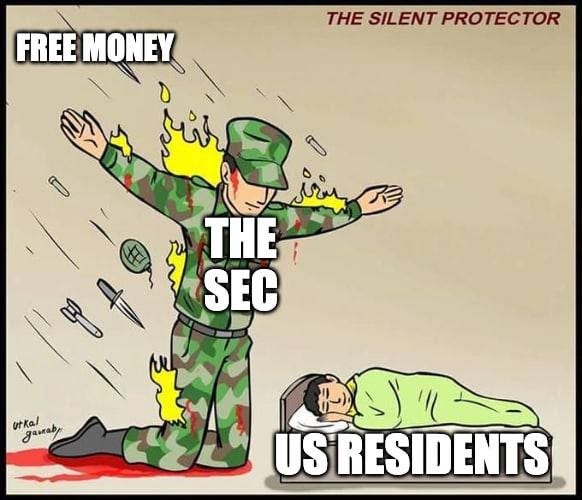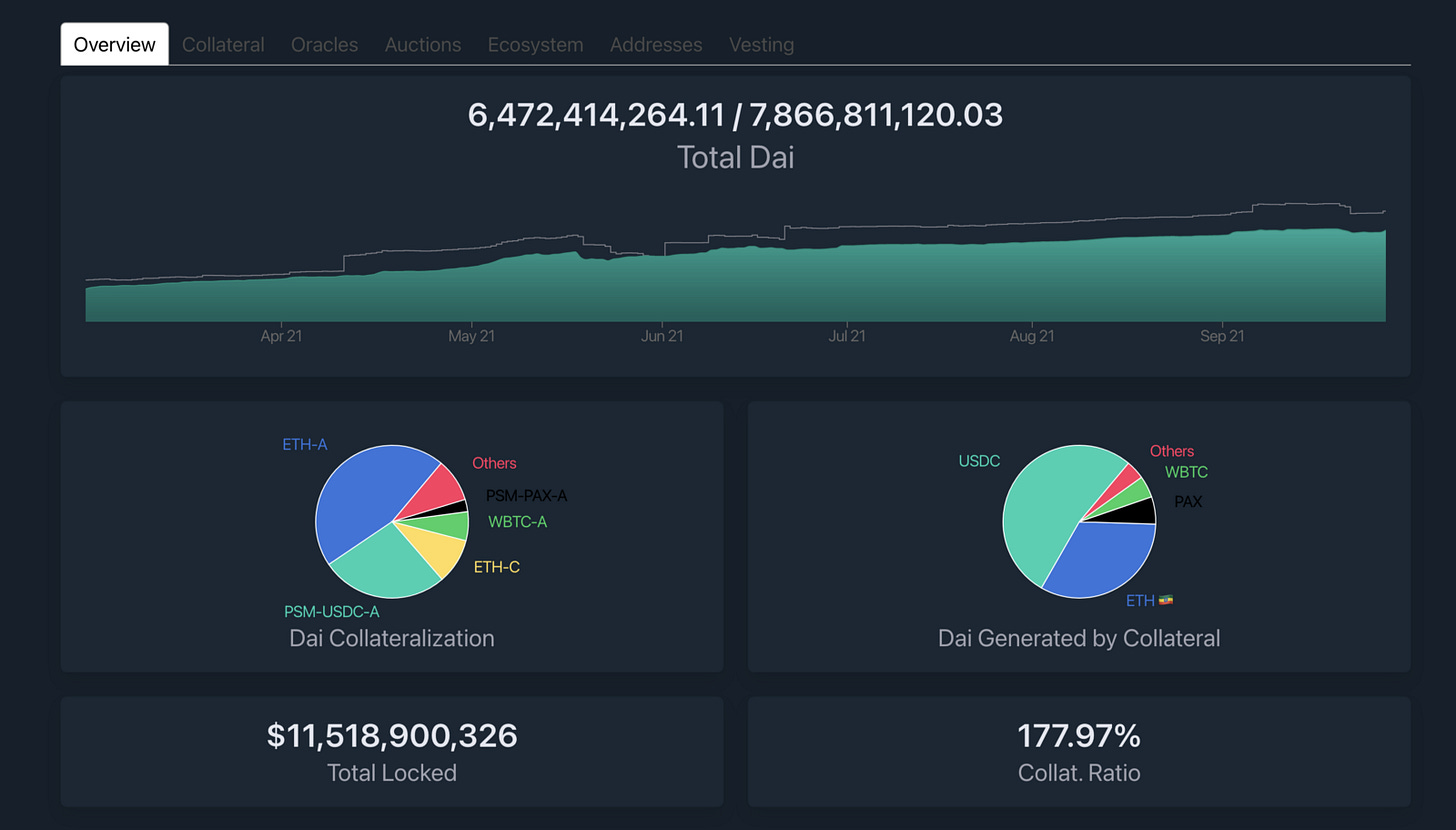Part 3 Beyond the Wall — Does SEC regulation accomplish goals?
The stated policy goals are to protect retail and encourage capital formation. Does retail feel protected by the current regulatory frameworks?
Part 1 and Part 2 of this “Beyond the Wall” series if you missed them.
Much of the essay has been spent on just the costs of the current regulatory regime in both compliance costs and the damage (whatever it is) to the pace of innovation. This essay will explore some basic questions regarding whether it is beneficial.
Does it weed out fraud?
Does the current disclosure regime really provide any actionable intelligence to the average retail investor?
Does retail feel protected?
Is decentralized finance (“DeFi”) more or less likely to build into a systematic risk than traditional finance?
Does it weed out fraud?
Assuredly having audited financials and risk of SEC censure would dissuade many fraudsters? But then again maybe not, there were over 400 class action security lawsuit filings in 2019. According to the Harvard study 1/14 S&P 500 companies were subject to litigation in federal courts in 2019 alone and 20% of IPO’s have been subject to a securities litigation filing in the 4 years after their IPO. As anyone who has invested for a time knows that the only one who wins in these cases are the attorneys with very few exceptions.
From personal experience, almost every class action securities claim is an exercise in frustration full packaging. It is difficult to track and see if the stock holding periods match the settlement claim form, and many of them that I have taken the hour or two to fill out result in rejection or a pittance. In other words, most of these securities fraud claims actually result in more harm than good for the average publicly traded stock investor. It is clear that the current regulatory frameworks do NOT in fact protect from fraud or we desperately need tort reform to prevent these lawsuits that damage common stockholders. I want to hear what Gensler plans to do to reform this seedy underworld, where common equity gets either defrauded with no redress OR has value of their investment needlessly slashed through the overzealous nature of our securities law bar.
What does the current disclosure regime really provide to the average retail investor?
Westeros has those with the gift of foresight and can see the past and the future through the eye of the one-eyed raven . Despite this power of vision, Westeros is still a mess. Most disclosure regimes are simply disclosing things that have already happened. When investing is actually about the future expectations of growth. Oddly, trying to have your CFO be a one-eyed raven and predict the future is a dangerous path that actually exposes the company to securities violations. So more and more are simply choosing not to provide forward looking guidance at all. The message is clear that it is better to provide no information, or copy and paste form bank disclosures than to provide anything that might constitute actionable intelligence to the average investor.
To show the overall paper avalanche that is the current disclosure regime I am going to link a 10K from GE for perusal. It is 262 pages and contains a long list of disclosures and risks, some financial information “the financials”, and plenty of CYA language put in there to try and avoid the securities litigation gauntlet above. If an investor only invests in five investments, that is 1,250 pages of annual report information to peruse. Let’s see what useful disclosures there are:
Captain Obvious:
COVID-19 — The global COVID-19 pandemic has had and is expected to continue to have a material adverse impact on our operations and financial performance, as well as on the operations and financial performance of many of the customers and suppliers in industries that we serve
Thanks Captain Obvious — You mean to tell me that a worldwide pandemic and lockdowns might impact business.
Global macro-environment — Our growth is subject to global economic, political and geopolitical risks
Thanks Captain Obvious-You mean to tell me that a global company such as GE might be adversely impacted if WW3 breaks out.
Industry dynamics and outlooks — The strategic priorities and financial performance of our businesses are subject to major trends in our industries, such as decarbonization and digitization, and we may not appropriately plan for or adapt quickly enough to dynamics that in some cases can take many years to play out.
Thanks Captain Obvious-You mean to tell me that we need to disclose that the company leadership itself might be wrong or incompetent.
Competitive environment — We are dependent on the maintenance of existing product lines and service relationships, market acceptance of new product and service introductions and technology and innovation leadership for revenue and earnings growth.
Thanks Captain Obvious-You mean to tell me that you don’t compete in a monopolistic industry .
Restructuring & retention — We have been undertaking extensive cost reduction and restructuring efforts; these efforts may have adverse effects on our operations, employee retention, results and reputation and may not achieve the expected benefits.
Thanks Captain Obvious-You mean to tell me that firing people and selling businesses might impact morale. The floggings will continue until morale improves, but if it doesn’t we disclose that here.
Business portfolio — Our success depends on achieving our strategic and financial objectives, including through dispositions, acquisitions, integrations and joint ventures.
Thanks Captain Obvious-You mean to tell me that to be successful you need to be successful. This was almost worth reading, little alone writing and filing with the SEC.
Intellectual property — Our intellectual property portfolio may not prevent competitors from independently developing products and services similar to or duplicative to ours, and the value of our intellectual property may be negatively impacted by external dependencies.
Thanks Captain Obvious-You mean to tell me that to be others might actually compete and copy us. One would think that us disclosing that we aren’t in a monopoly would be enough, but alas, this is for the super dense.
I could go on and these are just the highlights of the catch all disclose every possible risk in an inaccessible and lawyerly drawl that fills the page and really says nothing of any value. I do find it more than interesting that Michael Burry from the Big Short was successful because he actually read and scoured these reports for inconsistencies and material disclosures buried in the haystack of boilerplate language. Go to the part at 3:40, where they say only the lawyers read the disclosures. How then do these disclosures protect retail?
The Big Short (2015) — Dr Michael Burry analyzes Subprime MBSs (Feat. Margot Robbie) [HD 1080p]
Does retail feel protected?
This is a simple question and I am not sure the answer. From my cheap seats in the peanut gallery it appears to depend on which retail you are talking about.
The Baby Boomers seem to like their current system, they tear open the envelope of their Vanguard pension or IRA and look at the balance and say, boy ain’t life grand. This is somewhat of a misnomer though, as they still aren’t consuming the infinite disclosures buried in the haystack of 10k’s and 10Q’s “the paper dump”. They are actually relying on professional intermediaries to curate their investments into products. Then the investment gruel gets spoon fed to them like their Ovaltine. In other words, I doubt that many are actually reading their 10K’s, and those that do are probably actually “accredited” or institutional investors and not “retail” in any shape or form.
From the viewpoint of the younger generation, they look at it differently. Locked out of anything except for the same bloated overbought equities that their elders are about to sell the hell out of to fund their healthcare and retirement, they are looking for alternatives. Will the Youngs make mistakes investing, absolutely…they will. Mistakes are really a form of premium education in investing anyway. Maybe just maybe, we shouldn’t assume that the most educated generation in history is too stupid and unsophisticated to know how to invest their own money. If nothing else, with disintermediation of the fees associated with a curated investment experience they don’t even need to be that right to still outperform the Boomer cohort.
As a Gen Xer we are used to just watching the culture wars play out with a latch key around our neck, and apathetic angst. The Baby Boomers have a legacy system that they have a large stake in and it is clear that the Millenials and Gen Z are not quite feeling the same connection. It is probably normal to have generational conflict, but I think the sheer demographic heft of the Boomer generation has exacerbated the pent up frustrations of what I loosely call the Youngs.
The Youngs feel, in my observations, to have been rug pulled from home ownership and credit in 2008 and realize that inflation is the game being played to continue the facade and provide the exit liquidity for a generation that, on the whole, spent more than they earned on a public tax receipts basis. How else can they fund their retirements, but to have the ability to sell their houses and investments into a vortex of irrational exuberance and insanely valued equity valuations?
The Youngs no longer believe the disclosure, no longer trust the institutions and no longer believe that this is anything other than the latest in a long line of wealth transfers to plug a pension funding gap for their elders. Perhaps the governmental institutions should reflect on why they are losing legitimacy rather than try to mandate that they maintain it.
There is minority viewpoint and colorable disagreement within the SEC itself that is well worth a read. From Commissioner Hester Peirce speech:
One of today’s panels deals with “Reimagining Investor Protection in a Digital World.” When confronted with new technologies, new products, and new ways of doing things, the regulator’s tendency is to say no instead of yes, to say stop instead of go, to see danger instead of possibility. The regulatory labyrinth we have built over the years serves this “Not so fast, sonny, you might put your eye out!” mindset well. The SEC’s focus is appropriately on investor protection, particularly retail investor protection, and market integrity.
This Committee, however, can play a role in reminding us that investor opportunity matters too. By investor opportunity, I mean the chance for investors to try new products and services, to include in their portfolios new types of assets, to use the latest technologies, to get in on the ground floor of new opportunities, to experiment and learn from investment successes and failures. The regulatory process underrates investor opportunity, and investors lose out.
Investors want protection from fraud and easy access to robust disclosures, but they also want to be able to interact with their financial firms using the latest technologies, to have access to the full range of investment options, and to take charge of their financial future by spending their hard earned money as they see fit. Investors at times may be willing to take on more risk than the regulator thinks is prudent. A healthy regulatory response would resist the urge to override investor decisions and instead engage and educate investors using the same technologies through which they are investing. As you discuss digital platforms and other topics in the future, help us to remember that a regulator who always says no or takes too long to say yes is not serving investors well.
Is Decentralized Finance more or less likely to grow into a ‘systematic risk’ than traditional finance?
This is a really interesting chart from this article on naked credit swaps. Credit default swaps are not securities and not under the purview of the SEC, they are instead regulated under the CFTC for the most part. The above chart clearly portrays the systematic risk of “too big to fail” reflexive ponzinomics that was the state of affairs prior to the 2008 financial armageddon. AIG was the hub and insurer and taker of the other side of transactions from Goldman, Citi, Bofa, etc. So when these leaders and alums from Goldman talk about ponzi schemes, it is clear that they know what they are talking about. Overall, I am not sure why we seek leadership from the same folks that bet their firm on these positions and the only reason that Goldman didn’t follow Lehman and Bear Stearns down the drain is that they were bailed out specifically by the AIG rescue.
Senator Warren in an effort to head off decentralized technologies “defi”, wrote the following letter to US Treasury Janet Yellen.
What Senator Warren failed to mention was that the Financial Stability Board report (the report is also from 2019 which in crypto is eons ago) referenced as footnote 17 above, also said the following:
How can having a decentralized ledger lead to less systematic risk overall? Well it is clear that anyone with some chain analysis can effectively create a dashboard for a protocol system using the distributed ledger to see the assets that are held in the protocol. As an example, here is a dashboard using ‘on-chain’ queries from Dune analytics from MakerDAO, updated every few hours. This is real time on chain analytics, in other words these are living breathing financial statements.
Dashboard analytics can be used to query exposures, defi protocol overcollateralization ratios, etc to get a real picture of system health. For example the collateralization of the system is currently 177.97%. Point being is that having on chain open finance systems are the opposite of “opaque” as Senator Warren stated in her letter. They are the closest thing to real time financials and disclosures the world has ever seen.
The hypocrisy of many of the current regulators who had their jobs and wealth preserved through public bailouts, who had blood on their hands from the 2007–2008 financial crisis is staggering. The audacity of them lecturing us that we need to “trust” them to regulate decentralized finance because it poses some competitive risk to their financial incumbents that pay their speaking fees, provide their golden parachutes ane enable their rent seeking. “Defi” will need regulatory disclosures, constraints and monitoring, but until it becomes apparent what those risks are, the heavy handed regulatory posturing reeks of incumbent financial institutions using their regulatory captured positions to snuff out competition. Competition should be welcomed in financial services, perhaps especially, if it forces ossified industries and regulators into an uncomfortable position of having to reform and give up a scintilla of power.
Is this the end of the “Beyond the Wall” series?
Maybe, let us know what you think and share and comment if there are other topics to cover.
Special thanks to Nick Rishwain for providing feedback.
About LexDAO
LexDAO is a non-profit association of legal engineering professionals that brings the traditional legal settlement layer to code, and coded agreements to the masses. We believe that everyone deserves access to justice provided in a quick and efficient manner. If legal services were easier to use, verify, and enforce, we could live in a fairer world. Blockchain technology offers solutions to many problems in the legal space. Our mission is to research, develop and evangelize first-class legal methods and blockchain protocols that secure rules and promises with code rather than trust. We do this by training LexDAO certified legal engineers and building LexDAO certified blockchain applications. We strive to balance new deterministic tools with the equitable considerations of law to better serve our clients, allies, and ultimately citizens.
All links provided are for informational purposes only and not meant as recommendations of the people or products. Nothing herein is legal or financial advice and should not be relied upon without reaching out to your own personal attorney. The linked ABA disclaimer is appended to the blog.
Follow us on Twitter @lexDAO
Join our Discord lexdao.chat
Peruse our Github https://github.com/lexDAO













